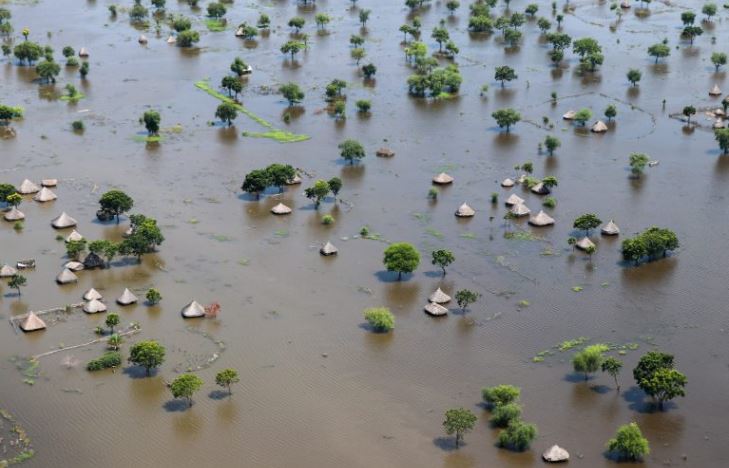BY MANAS JAMES OKONY
In a world where truth has always remained a victim in the battle for narratives, radio stands out as the most reliable and credible source of information in South Sudan. To us, this should be an asset worth cherishing, especially given the country’s alarmingly high illiteracy rate.
On 13th February, we gather to celebrate World Radio Day 2025 under the powerful theme, “Radio and Climate Change: A Powerful Tool for Climate Action.” This theme speaks volumes about our situation in South Sudan, highlighting the significant role that radio plays in promoting climate literacy, especially regarding flooding—a phenomenon our country has experienced for years.
Historically, floods as a natural phenomenon are not new occurrences in our country. Oral narratives passed down through generations describe the harrowing journeys our people have navigated during times of flooding and drought. In 1917, history records a devastating flood that hit my hometown of Akobo. The floods were severe, prompting the Anglo-Egyptian Sudanese authorities to relocate the fort, which served as the provincial (later district and county) headquarters, to Agii across the Akobo River from Akobo Gedim. Crisscrossing South Sudan from Abyei in the far north to Nimule in the south and from Raja in the far west to Pochalla in the far east, every ethnic group has a word for flood or drought, indicating that they all have a flood story to tell.
I share this historical precedent to make a case. Unarguably, climate change is real, and its effects are being felt today—this is enough to debunk the beliefs held by some who view the current floods, which are almost of Biblical proportions, as normal. Since the 1960s, floods have been well documented in South Sudan, and they have only become increasingly severe due to climate change and poor infrastructure, such as dykes and the construction of elevated structures, as the world’s newest nation tries to embark on robust developmental projects.
No area in South Sudan has been spared the devastating floods that have become a near “new normal” since 2019. However, states like Unity, Jonglei, and Upper Nile, with their location in the Nile River Basin and low-lying topography, are particularly vulnerable. For the civil population in the affected areas, their living conditions are dehumanizing. Access to food, medicine, health care, education, and information—basic rights enshrined in our constitution—are denied because they are cut off by the floods, amid a lack, or perhaps just a little, of intervention from the government.
This is where radio comes into play as a tool to advocate for climate action. Over the years, radio has amplified the voices crying out against the destruction of livelihoods and ecological degradation amidst a lack of telecommunication services, which have been further exacerbated by the floods. Radio’s role is not limited to this; it also serves as a rallying call for climate justice.
A push for climate justice
The illiteracy rate in South Sudan is one of the highest globally, at a little over 70 percent. This alarmingly high statistic means that the majority of those affected are ignorant of what climate change is, how it strikes, how climate change influences our lifestyles, and how our lifestyles, in turn, influence climate change—an influence that often manifests as floods or droughts. As media professionals, it is incumbent upon us to provide the climate literacy our people need to push for climate justice.
Suffice it to say everyone deserves the right to live in a healthy environment. Article 41 of South Sudan’s constitution tasks everyone with protecting the environment for this generation and future generations. With widespread deforestation due to logging for charcoal and the floods themselves, radio is, and will continue to be, immensely needed.
However, as we celebrate the achievements of radio, it is crucial to acknowledge the challenges it faces. Unstable power supply, poor remuneration conditions for workers, media restrictions, and limited resources pose significant obstacles to fully realizing radio’s potential. The recent decision by U.S. President Donald Trump to halt USAID funding globally will have far-reaching effects on the South Sudanese media landscape. Looking forward, we must address these challenges and support the expansion and sustainability of radio services.
As we celebrate this World Radio Day, let us use and support radio to promote climate literacy. Despite the allure of social media and other digital platforms, radio remains a trusted source of information. For this reason, radio deserves to be hailed as a powerful tool for climate literacy.
The writer, Manas James Okony, is a South Sudanese freelance journalist with a background in public health and an Honors degree from Upper Nile University. He writes for several media outlets, is a radio presenter, and is an IWMF fellow. He can be reached via manasjokony@gmail.com.
The views expressed in ‘opinion’ articles published by Radio Tamazuj are solely those of the writer. The veracity of any claims made is the responsibility of the author, not Radio Tamazuj.




